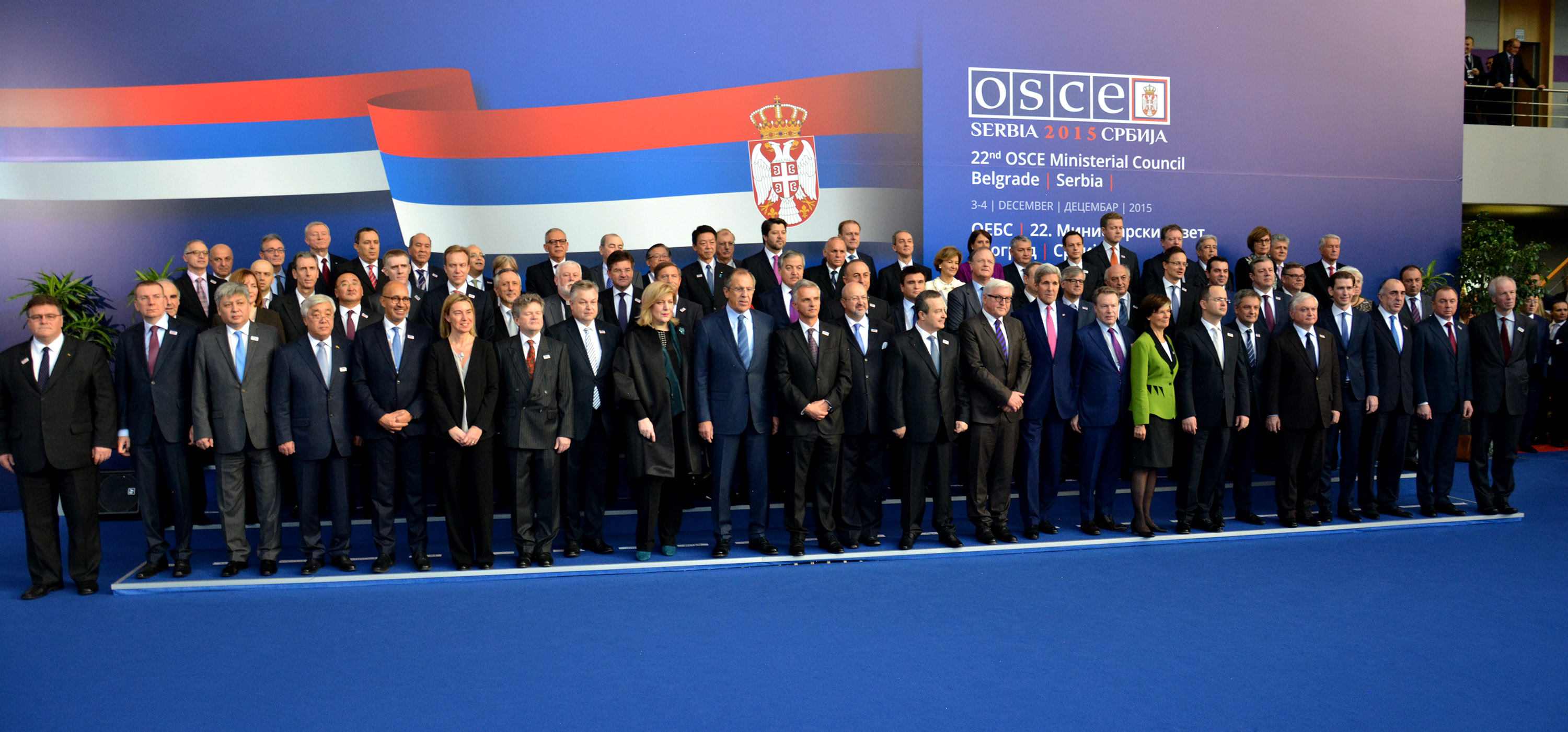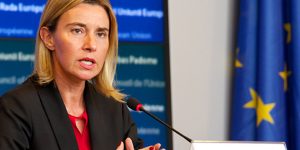Mr Prime Minister,
Dear Friends and Colleagues,
Forty years ago in Helsinki a fundamental and wise intuition was written down on paper: security in Europe needs cooperation in Europe. Today, the overwhelming feeling is that Europe is less secure than it used to be. The threats to our security have changed in nature. The means of our action must change too. But the core principle of our action is still the same that was defined in Helsinki 40 years ago: that cooperation is the key to our security. Cooperation inside the European Union, of course, and cooperation inside our continent. But as threats become global and borderless, cooperation on a global scale is also crucial. Security in Europe calls for a more cooperative and effective global order.
The past year has been marked by focusing on international terrorism and cross-border refugee flows. These are challenges we share: we can only address them together. We are and must be united in this.
Terrorism poses a direct threat to all countries and all people regardless of their ethnic background, religion or belief. Regardless of their nationality. The attacks in Paris, Ankara and Istanbul, Tunis, Beirut, Bamako and on a Saint Petersburg-bound airliner over Egypt – just to mention the most recent ones – are sad and clear reminders of this. Global terrorism can only be countered through international cooperation and determined national action. The defeat of Da’esh can only be achieved if we put an end to the Syrian civil war. And peace in Syria can only be achieved through a national, regional and international reconciliation: the process we started in Vienna is the only way forward. It is our common duty and responsibility to preserve and protect it, and make sure that our common work in that precious but difficult framework delivers. The world won’t excuse us if we fail on this because of short-sighted divisions. We have a collective responsibility in front of our own citizens and the international community: put an end to the war in Syria and unite forces against Da’esh.
The EU welcomes and supports the efforts by the OSCE to strengthen the capacities of participating States in the field of counter-terrorism and the prevention of radicalisation, as well as its efforts to foster partnerships with our Partners for Cooperation. Our discussions here in Belgrade offer the opportunity to make further progress in this respect.
The conflicts in our neighbourhood – in Syria, in Libya and beyond – as well as poverty and the lack of socio-economic perspectives have led to refugee and migratory flows across neighbouring countries and Europe not seen in generations. As European Union, we have mobilised all instruments at our disposal to respond to this dramatic situation, supporting our friends in the region and finding ways in Europe. But no state can respond to such a challenge on its own. Only together, through cooperation, can we effectively manage the large flows of people, provide protection, and address the root causes of migration and displacement.
The European Union is strengthening its partnerships with countries of origin and transit of migrants and refugees. In this respect, the OSCE constitutes a fundamental platform for dialogue and coordination. Its expertise on border management and the fight against the trafficking of human beings are even more valuable today. Because these are the two main issues we have to tackle together: addressing the root causes and dismantling the criminal transnational organizations and networks that are making money out of people’s despair.
Mr Chairman,
Over the past year international cooperation on our common challenges has stepped to a new level. There are reasons for hope even in these difficult times. The nuclear deal with Iran will stay as a milestone in multilateral diplomacy. And today we all acknowledge that the terrorist threat can only be defeated in partnership. On migration, let me recognise that an almost unanimous vote in the UNSC endorsing the EU naval operation against human traffickers was a major achievement – also thanks to our common work with Russia. So there is space for a fruitful cooperation, in Europe and at a global level.
At the same time, we still have to face hard and difficult divisions among us, on some key, basic issues. The illegal annexation of Crimea and the destabilisation in eastern Ukraine continue to put fundamental OSCE principles into question.
The situation created by the illegal annexation of the Crimean Peninsula remains unchanged, and violations of human rights in Crimea by the de facto authorities have been repeatedly highlighted, including by ODIHR and the High Commissioner on National Minorities.
In eastern Ukraine, the ceasefire largely holds and the level of violence has diminished compared to last year. However, foreign forces have not yet been withdrawn and the separatist-controlled areas, including the border area, remain out of reach for the legitimate Ukrainian authorities. The direct and indirect consequences for the civilian population are dire.
The European Union sponsors all efforts for a solution that respects Ukraine’s sovereignty, unity, independence and territorial integrity.
The European Union supports the efforts of the Trilateral Contact Group and Normandy Format to create the conditions in which the Minsk Agreements can be fully implemented: only their complete implementation can guarantee that this crisis will not turn into another protracted conflict. It is time for the participants in the Trilateral Contact Group and its sub-groups to show determination and achieve concrete progress. A crucial test will be the holding of local elections in certain areas of the Donetsk and Luhansk regions in accordance with Ukrainian law and relevant OSCE standards and monitored by ODIHR.
The OSCE has a unique leading role both on the political track, in the Trilateral Contact Group and its sub-groups, and on the ground, undertaking crucial monitoring and verification. The Special Monitoring Mission must be able to continue its core stabilisation and transparency function without any obstacle. Jamming and denial of access to the monitors must stop, notably in the separatist-controlled areas and along the border with Russia.
The European Union also highly values the work of the OSCE Project Coordinator in Ukraine and the important contributions made by the OSCE autonomous institutions, including in Crimea.
With regard to other parts of the OSCE area, the EU is concerned about a very slow progress in conflict resolution related to Transnistria, rising tensions related to Nagorno-Karabakh and further entrenchment of the conflicts in Georgia.
No benefits can be derived from perpetuating these conflicts. For no one. We urge all parties involved to work in good faith towards political solutions that respect the OSCE’s principles. The EU remains committed to be actively involved in the settlement processes.
Mr Chairman,
The European Union is more than ever committed to strengthening the OSCE as an instrument towards security and cooperation in Europe. Its comprehensive approach to security is the right one. There cannot be sustainable security without respect for human rights, democracy and the rule of law. The European Union will keep working to strengthen the OSCE commitments in the human dimension, including with regard to fundamental freedoms. We are worried that the independence of the OSCE autonomous institutions, which assist participating States in the fulfilment of their commitments, has been put into question by some.
The OSCE was born out of the need to increase confidence between opposing blocks of countries. Today we live in a different era of history. Still, we are far from having built that new world order that would guarantee real peace and cooperation in our continent.
Most of the tools that were put in place 40 years ago remain necessary. Instruments of military transparency, in particular, could play an important role today in fostering confidence and stability. The European Union encourages all participating State to engage constructively in the modernisation and adaption of these valuable tools.
Resolving the conflicts in the OSCE area and its neighbourhood, combatting terrorism, and managing the refugee crisis require our cooperation.
The raison d’etre of the OSCE is confirmed each and every day: we need an even more solid framework for dialogue across Europe and beyond. It is cooperation that will build and safeguard our collective security and peace.
We live in a very small world: only united will we make it more secure. Some are trying to foster divisions among us, because divisions make them strong. They are agents of chaos, as chaos is their breeding ground. Against these threats, our most effective answer is our cooperation. Against chaos, we have a duty and a common responsibility to work towards a more cooperative world order. It was the original intuition of the OSCE, and it’s even more relevant today.
Let me thank the Serbian Chairmanship for its tireless efforts over the past year and for preparing today’s discussion. Let me likewise assure the incoming Chair of our full support.
Thank you!




